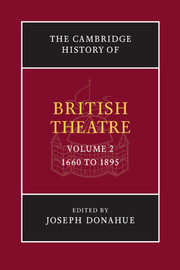Book contents
- Frontmatter
- Part I 1660 to 1800
- Part II 1800 to 1895
- 11 Introduction: the theatre from 1800 to 1895
- 12 Presence, personality and physicality: actors and their repertoires, 1776–1895
- 13 Theatres, their architecture and their audiences
- 14 Stage design from Loutherbourg to Poel
- 15 Theatre and mid-Victorian society, 1851–1870
- 16 Gendering Victorian theatre
- 17 Popular entertainment, 1776–1895
- 18 The Bells: a case study A ‘bare-ribbed skeleton’ in a chest
- 19 The new drama and the old theatre
- 20 1895 A critical year in perspective
- Bibliography
- Index
- References
20 - 1895 A critical year in perspective
from Part II - 1800 to 1895
Published online by Cambridge University Press: 28 March 2008
- Frontmatter
- Part I 1660 to 1800
- Part II 1800 to 1895
- 11 Introduction: the theatre from 1800 to 1895
- 12 Presence, personality and physicality: actors and their repertoires, 1776–1895
- 13 Theatres, their architecture and their audiences
- 14 Stage design from Loutherbourg to Poel
- 15 Theatre and mid-Victorian society, 1851–1870
- 16 Gendering Victorian theatre
- 17 Popular entertainment, 1776–1895
- 18 The Bells: a case study A ‘bare-ribbed skeleton’ in a chest
- 19 The new drama and the old theatre
- 20 1895 A critical year in perspective
- Bibliography
- Index
- References
Summary
The theatrical year 1895 would, no doubt, have been characterized by Lady Bracknell, its most enduring contribution, as crowded with both incident and premature experience. Its greatest sensation was, to be sure, the meteoric fall of Lady Bracknell’s creator. In mid-February Oscar Wilde had two highly successful works playing opposite one another at two of the West End’s principal playhouses. An Ideal Husband had opened at the Haymarket in early January, with matinée idol Lewis Waller in the role of Sir Robert Chiltern. It was still performing to packed houses when, the following month, George Alexander opened The Importance of Being Earnest to enthusiastic notices at the St James’s. Wilde, now at the peak of his powers, was applauded alike by actor-managers, play-goers and progressive critics who counted him among the reformers of the British stage. Weeks later his career lay in ruins. The libel charges he had pressed against the Marquess of Queensberry triggered the succession of trials that in a matter of months brought him to Reading Gaol, convicted of ‘gross indecency’. Wilde’s name disappeared from programmes and playbills, and by late spring both works had been taken off by their respective managements. Clement Scott, doyen of London’s critical fraternity, responded in predictable (and personal) fashion:‘ Open the windows! Let in the fresh air!’An exasperated William Archer, translator and general champion of Ibsen in England, read the event as a serious blow for the development of a home-grown avant-garde: ‘Really the luck is against the poor British drama.’
- Type
- Chapter
- Information
- The Cambridge History of British Theatre , pp. 422 - 439Publisher: Cambridge University PressPrint publication year: 2004

